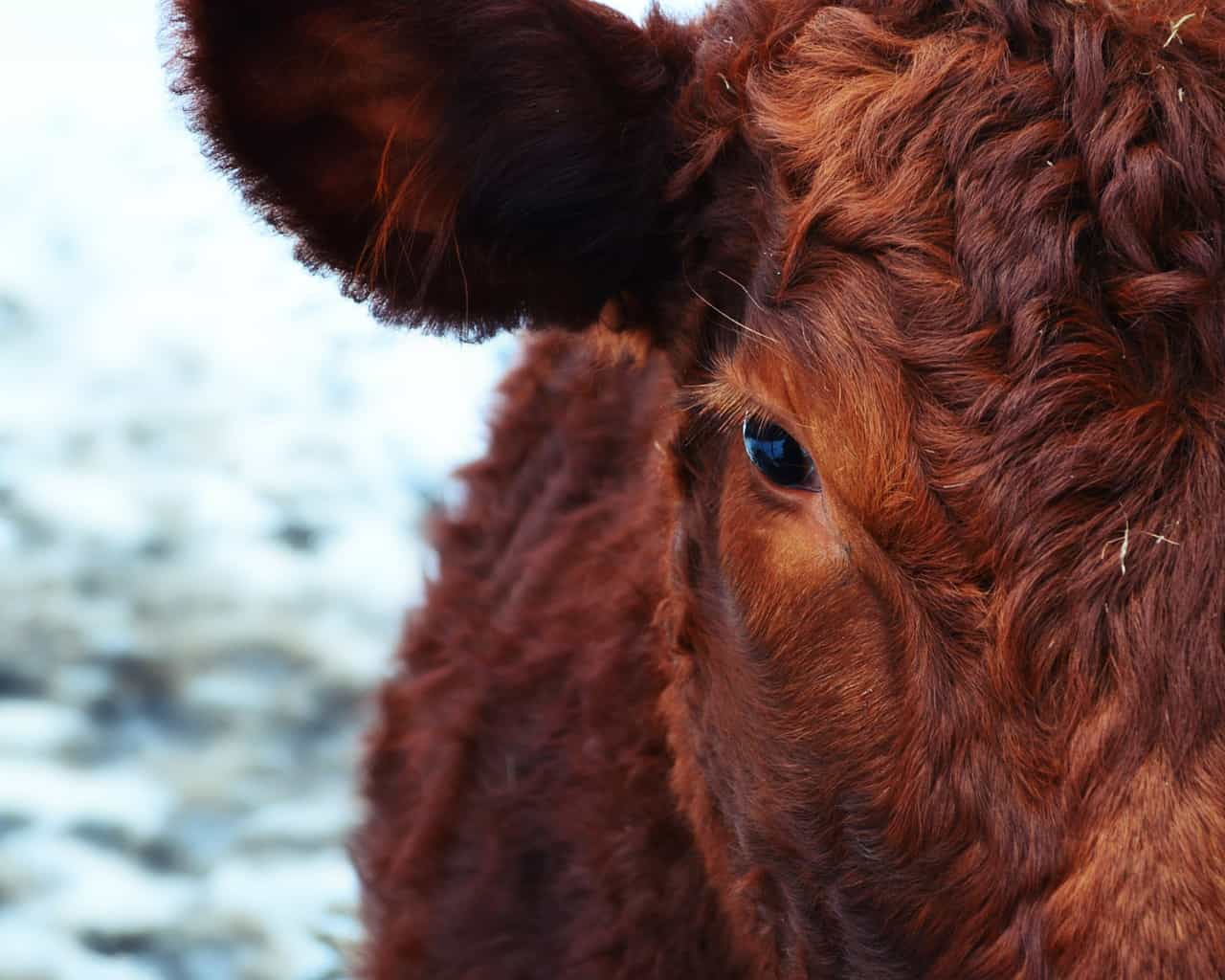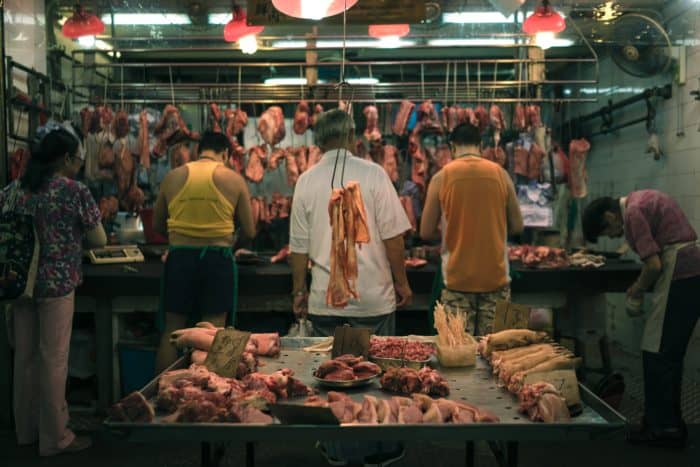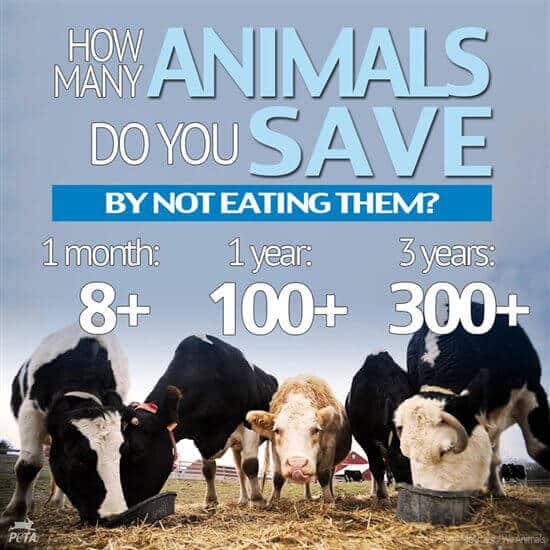Besides your typical excuses for not becoming vegan, there’s another interesting point that I’m starting to hear more often.
People are saying that they understand what’s happening but don’t have the mental capacity to become vegan right now. And that there are more pressing issues that need to be addressed first.
I think this statement is fascinating. The key phrase here is “mental capacity.”
This is a familiar feeling for many of us.
“I know there are billions of animals being slaughtered each year, but I’d prefer not to think about it as I’m going through a tough time.”
“I’m aware that fossil fuels are destroying our planet, but I feel too helpless to make an impact.”
“I know that a young child was paid an absurdly low wage to make this jacket, but that’s just the way of the world. What can I do?”
I get it. I, too, was once overwhelmed with how broken the world is and found it much easier to turn a blind eye to it.
And the truth is, we still don’t know even a fraction of what’s happening behind the scenes.
In this post, I want to share a few thoughts to help address the concerns around not having the capacity to make a difference.
Don’t aim for perfection, strive for progress
As humans, we feel strongly about contradictions. If you’re going to do something, you need to do it correctly, right?
I have a different point of view. Even though I became vegan overnight and haven’t looked back, I still think it’s okay to be flexible when exploring such a change.
It doesn’t have to be an all or nothing approach, although this can be very effective.
An alternate path to veganism could look something like this:
- Give up chicken and seafood
- Give up red meat
- Give up eggs
- Give up dairy
- Give up leather
- Give up honey
- Give up glycerin
- Give up wool
Again, you can make the change instantly, or you can make the change over time.
Either way, with each decision, you’re lessening your impact on animals.
According to PETA, you can save 8+ animals a month or 100+ animals a year by not eating them.
If you’re interested, here’s a more in-depth article about how many animals a vegetarian saves each year.
If you’re more interested in saving lessening your footprint on the planet, Kathy Freston, best selling author and activist, put together the following statistics on what would happen if everyone in the US went vegetarian for just one day.
The US would save:
- 100 billion gallons of water, enough to supply all the homes in New England for almost four months;
- 1.5 billion pounds of crops otherwise fed to livestock, enough to feed the state of New Mexico for more than a year;
- 70 million gallons of gas—enough to fuel all the cars of Canada and Mexico combined with plenty to spare;
- 3 million acres of land, an area more than twice the size of Delaware;
- 33 tons of antibiotics.
If everyone went vegetarian for just one day, the U.S. would prevent:
- Greenhouse gas emissions equivalent to 1.2 million tons of CO2, as much as produced by all of France;
- 3 million tons of soil erosion and $70 million in resulting economic damages;
- 4.5 million tons of animal excrement;
- Almost 7 tons of ammonia emissions, a major air pollutant.
The ripple effect
We grossly underestimate ourselves.
What might seem insignificant to you could have an indirect ripple effect on those around you.
I can’t tell you how many times my little actions and comments have helped spread veganism awareness. Even just labelling myself as a vegan has gone a long way.
I’ve had friends who meet someone else, and the topic of consuming meat comes up. They both went on to discuss how they each had a vegan friend. Whether they agree with veganism or not, they’re talking about it, which they would never have been doing, if I didn’t say, “I’m vegan, and I don’t eat animals”.
Here are some more examples of how simple actions and gestures can have a ripple effect on those around you:
- I bring my own jars and bags with me every time I buy groceries
- I only have a few items of clothing that I really like
- I would love to adopt a child one day
- I only buy fair trade coffee
Little comments like these are things people around you will remember. And even if they forget about that moment, you’ve opened up their subconscious to be more aware of the impact of their actions.
So next time you think that you can’t give up meat, think about how the simple act of saying no to meat for your next meal can have an impact on the world.
Then once you realise how easy it is, you’ll have the confidence to say no again for next time.
Other articles you’ll love:
- Vystopia: The Anguish of Being Vegan in a Non-Vegan World
- Extending The Definition of Veganism
- Are You a Junk Food Vegan?






I love animals but I could never give up eating meat.
And what if I know about all the cruelties that happen in the meat/animal product industry – in great detail – but I’m simply at peace with it? It’s not that I’m trying not to think about it, or distract myself from it – I’m literally at peace with it. How would you go about convincing someone like me into adopting veganism? There is no way. I’ll happily eat plant-only meals every now and then for the taste and novelty factor, but I just don’t see a reason to restrict myself to them fully.
Hello,
This was a very interesting read, as are most of the articles on this website. I am pro veganism and think that anyone who CAN be vegan, SHOULD be vegan. I personally have quite a few health issues that hold me back from being able to go vegan as I can’t eat many of the staple foods and would not get enough protein or enough of many vitamins. Most people however are not in my position, and for most being a meat eater is a matter of choice. It makes me sad that I can’t go vegan, I would be if I could be.
That being said, I think it is unwise to cite PETA in an article that is trying to convince others to go vegan. PETA is not an ethical source, and frankly I’m shocked that while you do so much research on animal cruelty and the environment, you don’t do the same research into the organizations you choose to promote. It’s a bit worrying, to be honest. There are many other environmental / vegan organizations that do not have the nasty history that PETA does, and to readers you would seem a lot more credible if you cited from ethical sources.
If you’re interested in looking into the issues surrounding PETA, here are some starter sources:
https://www.theatlantic.com/amp/article/254130/
https://www.huffingtonpost.co.uk/lucy-uprichard/the-many-failings-of-peta_b_2945870.html
https://www.psychologytoday.com/us/blog/canine-corner/201204/when-the-ethical-treatment-animals-goes-wrong
http://articles.latimes.com/2008/sep/26/business/fi-icecream26
https://www.bet.com/news/national/2011/07/21/another-peta-exhibit-compares-animal-cruelty-to-slavery.html
https://www.youtube.com/watch?v=lZia8DCSYFU
https://www.peta.org/features/got-autism-learn-link-dairy-products-disease/ (“Cure autism by giving up dairy”)
https://www.youtube.com/watch?v=w7l3ojNQYsg (Comedic parody of domestic abuse)
https://thesocietypages.org/socimages/2008/05/05/petas-holocaust-on-your-plate-campaign/
https://www.peta.org/blog/westminster-dog-show-protest/
https://jezebel.com/5345010/peta-founder-apologizes-for-save-the-whales-billboard (Fat shaming)
http://gawker.com/5901093/petas-latest-pro-vegan-campaign-involves-fat-shaming-dead-people
http://www.nokillnow.com/newkirkspectorinterview.html (“Seeing eye dogs are servants, should be taken from blind people”)
https://www.washingtontimes.com/news/2015/apr/16/joe-arpaio-petas-pamela-anderson-team-up-to-make-p/ (Supports a prominent white supremecist)
https://twitter.com/peta/status/1070066205170397184?s=21 (Released promo saying that “anti animal” phrases such as “take the bull by the horns” are akin to homophobic and racist slurs)
Ect…….
Hi, again Parker 🙂 We’re glad you enjoyed this post. It’s a shame to hear about your health, and we hope that you’re on a positive path.
We quite often hear that people can’t go vegan due to a lack of protein and vitamins. In fact, we’ve had our fair share of health battles over the years. Having said that, we’ve consulted with medical professionals and have found plant-based foods and nutrients to help our health. If you haven’t already, we’d suggest you continue to seek multiple health opinions from numerous practitioners. Because, at least in our experience, as a vegan, you have to fight and dig deeper to find solutions. It’s incredibly tedious, but we find it’s worth the effort.
Regarding PETA, we agree that while many of their campaigns can be questionable, it doesn’t mean we discredit all of their efforts. We rarely reference them on our blog, but when we do, we hope our readers understand our intent and are forgiving as a result. Thank you for your passion and concerns.
Okay I’m cocvennid. Let’s put it to action.
Sorry, I just saw your comment Lore. You’re right. It’s time to do something.
michael:
what are the benefits of reducing glycerin use?
thank you.
ox
Hi Melanie,
A lot of people swear by glycerin. However it’s normally derived from animal fats, therefore it’s not vegan friendly. PETA has an interesting list of animal-derived ingredients http://www.peta.org/living/other/animal-ingredients-list/
Melanie, what do you use glycerin for? Glycerin can be derived from both animals and plants. If you do have to use glycerin for whatever purpose, search for the certified plant based ones. Otherwise I’m sure you would be able to find good vegan alternatives for the same purpose.
Hi Micheal,
Thanks for another inspiring post!
About leather I’ve not given it up but trying to buy used leather jacket or shoes which might not be effective but at least a starting point.
Bought my winter leather jacket at a flea market years ago and still use it.
I understand it would be more effective and coherent to give up on leather but I guess I have to start somewhere.
Throw away good leather clothes is probably not ethical as well…
Just my personal thoughts.
Thanks, ciao
Chiara
i think buying previously used leather products is def effective. i also choose not to purchase leather, but will buy previously use. ox
As a new vegan I too kept my old leather handbag. But with time my views changed. When we use any animal product, we are in a way sending out the message that it’s OK to commoditize animals which goes against the basic tenet of animal rights that “animals are not ours to use.” Leather is not a necessity and we can find non-animal alternatives for that. Don’t throw away your old leathers/woolens, donate them to a homeless shelter instead. Tho there are vegans who bury their leather/wool products in a symbolic gesture as animal skin or fur are not “products” for us to use.